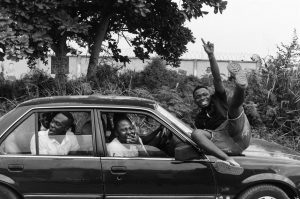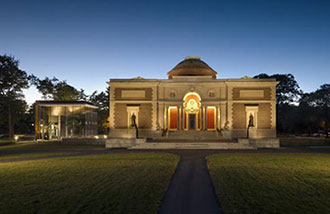
Eric Gyamfi
Ghanaian, born 1990
“H., A., O., M. and Y. hanging out on a weekend when one of H.’s friends got married,” Just Like Us Series
2016
Photograph
Collection of Eric Gyamfi
In his aptly named series Just Like Us, Ghanaian photographer Eric Gyamfi documents the lives of queer Ghanaians, actively choosing to portray them as regular complex individuals rather than victims. Gyamfi said that he started the series “to show people that queer people are people first and that they cut across all categories of humanness. There is no singular way of showing who a queer person is, I feel. They can be anything or anybody” (Naughton 2017). In this photograph, the smiling faces of five men hanging out suggest the joy and love they feel in being in each other’s company. In a country where same-sex relationships are illegal, their joy is not only an act of resistance, but also a testament to the universal human need for connection and community.
Saidou Camara ’19
Bibliography
Baisley, Elizabeth. 2015. “Framing the Ghanaian LGBT rights debate: competing decolonization and human rights frames.” Canadian Journal of African Studies 49, no. 2: 383-402.
This article explores the appropriation of decolonization and human rights frames by the competing pro- and anti- LGBT rights movements.
Naughton, Jake. 2017. “Photos That Celebrate Ghana’s L.G.B.T. Community.” The New York Times, The New York Times Company, 4 Apr. 2017, lens.blogs.nytimes.com/2017/04/04/photos-celebrate-ghana-lgbt-community/
This article provides more information on Eric Gyamfi’s Just Like Us series and includes some quotes by the artist himself.
Norman, I.D. et al. 2016. “Homosexuality in Ghana.” Advances in Applied Sociology 6 (2016): 12-27.
This article serves as an exhaustive overview of homosexuality in Ghana finding that while some are changing from ambivalence to clear opposition to homosexuality others are increasingly accepting.
Quist-Adade, Faith Bates, and Nubwa Wathafana. 2014. “Homosexuality in the Ghanaian Media: A Preliminary Survey.” International Journal of Linguistics, Literature and Culture 1, no. 2: 17-43.
This article explores how queer Ghanaians are represented in Ghanaian media, finding that it abounds in negative stereotypes that contribute to negative attitudes towards homosexuality.

